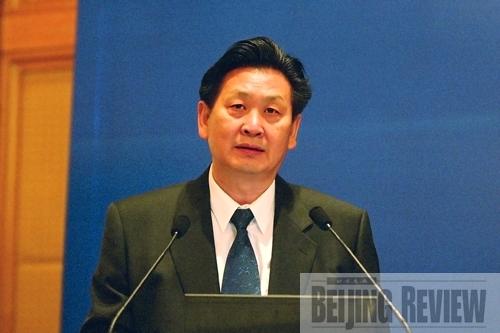|
 |
| Gao Quanli, Vice President of the Chinese Academy of Social Sciences, delivers a speech at the opening ceremony of the Second International Forum on Northeast Asia Regional Cooperation and Development in Harbin, capital of northeast China's Heilongjiang Province, on June 13 (NORTHEAST.COM.CN) |
Amid the global financial crisis, Northeast Asian states must take advantage of each other's strengths, seek development, and cope with regional issues through negotiation and consultation, a top scholar said on Sunday.
Gao Quanli, Vice President of the Chinese Academy of Social Sciences, made the remarks at the opening ceremony of the Second International Forum on Northeast Asia Regional Cooperation and Development in Harbin, capital of northeast China's Heilongjiang Province.
Gao said the idea of "cooperation brings common development" is widely appreciated in the international community. Northeast Asian states enjoy good conditions and cultural environment, which could produce huge potential for cooperation.
"The current global financial crisis may provide a historic opportunity for Northeast Asian states to raise the level of economic cooperation, because developing complementary resources, technologies and products among concerned states is crucial for regional development," Gao said, adding that new forms of cooperation will help strengthen the region's economic power.
Morio Matsumoto, Japanese Consulate General in Shenyang, said Japan and China have constructed friendly relations with the goal of "common interests" in the economy, environmental protection and energy that are based on the awareness that "the two sides have become indispensable partners." He suggested more detailed Japanese-Sino cooperation in logistics, environmental protection and agriculture.
Bing Zheng, head of the Jilin Province Academy of Social Sciences, told Beijing Review that he is confident about the prospects f0r economic cooperation among Northeast Asian states. According to Bing, current regional cooperation has four features: There is consensus on joint development; bilateral economic cooperation is developing rapidly; multilateral economic cooperation lags behind and is developing slowly; and the governments of China, Russia, the Democratic People's Republic of Korea, the Republic of Korea, Japan and Mongolia are seeking international cooperation in various ways.
"Northeast Asian states are relatively close geographically, and thus the mobility of economic factors is relatively convenient. The infrastructure is basically good. Convenient traffic reduces the costs of trade and transportation," Bing said. "These features are rarely seen in other parts of the world, and help form a good basis for the development of regional economic cooperation. But there are some challenges. For example, the situation on the Korean Peninsula complicates regional economic cooperation. Differences among Northeast Asian states in terms of social system, history and culture, economic level and state-to-state relations need time to be understood and adjusted."
The opening ceremony of the forum coincided with Chinese President Hu Jintao's attendance at the annual summit of the Shanghai Cooperation Organization (SCO) and the first meeting of BRIC (Brazil, Russia, India and China) leaders in Russia's Ural city of Yekaterinburg. Hu will also pay a state visit to Russia at the invitation of Russian President Dmitry Medvedev. Bing said Hu's visit to Russia would push forward Sino-Russian business cooperation.
"Construction on the China section of the 1,030-kilometer-long China-Russia oil pipeline began in May at Xing'an Township in the border county of Mohe, Heilongjiang Province. It is a good start for further cooperation," Bing said. "On China's side, it should increase export products to Russia, pay more attention to establishing and maintaining business credibility, and improve product quality and marketing, which will pave the way for a better marketing environment."
Bing said the forum could be seen as a platform for Northeast Asian states to communicate with each other, understand each other and forge friendships, which will play a positive role in pushing forward further regional cooperation. It is important for governments, corporations, academics and non-governmental organizations in the region to do more for better cooperation.
(Reporting from Harbin, Heilongjiang Province) |
